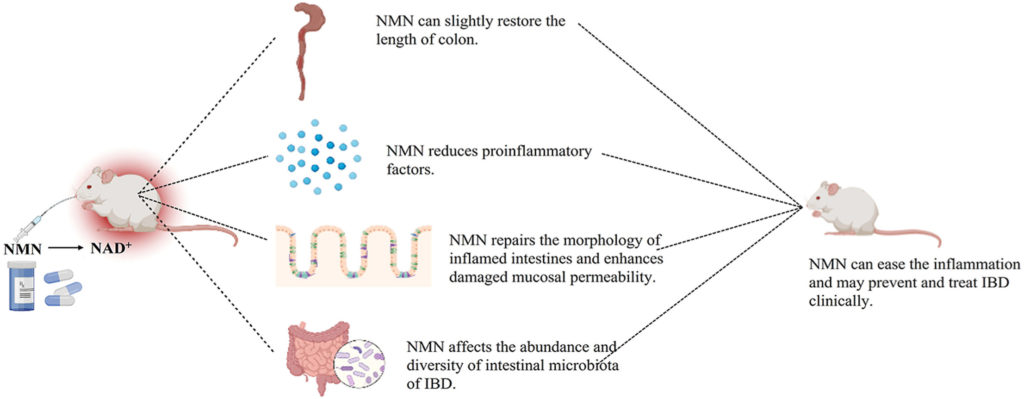Study Suggests NMN Can Treat Inflammatory Bowel Disease
Scientists in China show that NMN increases intestinal mucus secretion, repairs the intestinal wall, and promotes probiotic growth in a mouse model for inflammatory bowel disease.
Highlights:
- Intestinal mucus secretion is increased by treatment with NMN in mice modeling inflammatory bowel disease (IBD).
- Intestinal wall leakage is repaired by NMN treatment.
- Beneficial bacteria called probiotics are elevated by NMN.

Aside from pleasure, the food we eat is useless unless the nutrients it contains are absorbed through our intestinal wall. Furthermore, if our intestinal wall is leaky, unwanted molecules can sneak into our bloodstream and harm our tissues and organs. This poor nutrient absorption and leaky intestinal wall are characteristic of inflammatory bowel disease (IBD), a disease on the rise within the aging population.
Now, researchers from Jiangsu University in China report in Current Research in Food Science that NMN could treat IBD. Huang and colleagues show mice that model IBD have poor mucus secretion, heightened inflammation, and intestinal wall leakage. Feeding NMN to these IBD mice increases their mucus secretion, hampers inflammation, and repairs the intestinal wall. Furthermore, beneficial gut bacteria flourish as harmful gut bacteria dwindle when NMN is fed to IBD mice.
NMN Repairs the Intestinal Wall and Recomposes Gut Bacteria
Our intestinal wall is a barrier that prevents toxins and bacteria from entering our bloodstream. This barrier includes mucus secreted by specialized (goblet) cells. To establish a model for IBD, Huang and colleagues placed a toxic carbohydrate called dextran sodium sulphate (DSS) into the drinking water of mice. The DSS mice displayed impaired intestinal wall mucus secretion, as shown by a dye that stains mucus blue. Feeding DSS mice NMN restored much of this mucus secretion, suggesting NMN improves the protective layer of mucus lining the intestinal wall.

To test the effects of NMN on intestinal wall leakage, Huang and colleagues fed mice a small fluorescent molecule capable of permeating the gut wall. When the intestinal wall is damaged, this molecule can leak into the bloodstream and be imaged. When imaged, the DSS mice displayed body-wide fluorescence of this molecule, indicating a leaky gut. Treating DSS mice with NMN limited fluorescence to the gut region, indicating that NMN reduces gut barrier damage and permeability.

Our gut contains different species of bacteria, some of which are beneficial to us and protect gut barrier function and some that are harmful to our intestinal wall. Huang and colleagues showed that DSS mice had altered gut bacteria abundance. However, treatment with NMN increased the abundance of beneficial bacteria (Firmicutes, Verrucomicrobia, Akkermansia, and Lactobacillus), demonstrating that NMN could treat IBD-induced gut bacterial changes.
NMN and the Aging Intestine
The findings of Huang and colleagues suggest that NMN could at least partially treat IBD, an inflammatory disease. Since inflammation underlies many age-related disorders, based on these results, it’s possible that NMN could also treat the decline of the intestine that occurs with natural aging. Other studies have shown that NMN reverses age-related gut barrier weakness in mice and increases the survival of mice modeling IBD. Furthermore, it was shown that NMN protects the intestinal wall by altering gut bacteria diversity. Together, these animal studies suggest that NMN can treat intestinal aging.
Model: C57BL/6J mice fed dextran sodium sulphate
Dosage (oral): 1000 mg/kg of NMN

